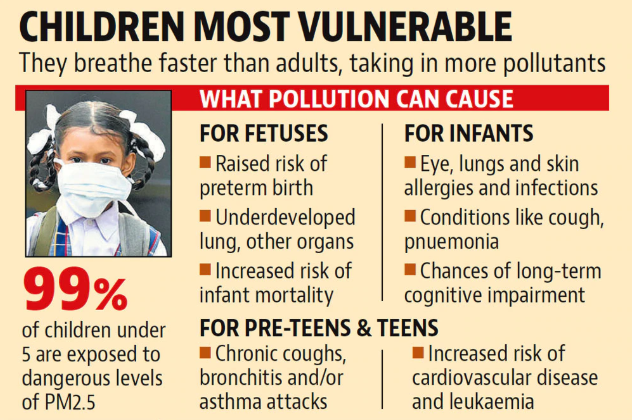Health Emergency in New Delhi
Why in News
- Recently, the Environment Pollution (Prevention and Control) Authority- EPCA declared a public health emergency in New Delhi as pollution levels entered the ‘severe plus’ category.
- An Air Quality Index (AQI) above 500 falls in ‘severe plus’ category. According to the Central Pollution Control Board (CPCB), the overall AQI score of New Delhi crossed 500 mark.
Key Points
- Deterioration in air quality is due to a combination of several factors:
- Local pollution produced by vehicular and industrial pollution. It got further spiked by bursting of crackers on Deepavali.
- Stubble burning in states of Punjab and Haryana: CPCB held that stubble burning contribution to pollution has gone up to 45%, resulting in the high particulate matter concentration.
- Extremely adverse weather conditions: Northwesterly winds brought high quantities of smoke from Punjab and Haryana to Delhi-NCR.
- Symptoms associated with this pollution are irritation in the eyes and throat, dry skin, skin allergies, chronic cough and breathlessness.
- Government has taken a series of incremental steps as the quality of the air deteriorates. For Example:
- Odd-even scheme: Under the scheme, vehicles with odd last digit in the registration number will ply on odd days and those with even last digit on even days
- Imposition of Environment Compensation Charge (ECC) at toll plazas.
Environment Compensation Charge
- Environment Compensation Charge (ECC) is a Supreme Court directed green tax.
- Green Taxes are one of a variety of policy measures formulated by the government to control activities that affect the environment.
- It is a type of ‘cess’ which has no legislative backup that usually accompanies the imposition of tax on public activities.
- A cess is usually imposed additionally when the state or the central government looks to raise funds for specific purposes.
- Distribution of N95 mask: A disposable N95 mask is a safety device that covers the nose and mouth and helps protect the wearer from breathing in hazardous pollutants like PM 2.5.
- Under the Graded Response Action Plan (GRAP) schools are shut down till the air quality remains severe
- GRAP is an emergency action plan in Delhi to tackle rising air pollution.
- It was prepared by the Ministry of Environment, Forests & Climate Change (MoEFCC) after the order of Supreme Court of December 2016.
Environment Pollution (Prevention and Control) Authority
- EPCA was constituted under section 3 of the Environment (Protection) Act, 1986 for the National Capital Region in compliance with the Supreme Court order dated January 1998.
- It has the power suo-moto, or on the basis of complaints made by any individual, representative body or organization functioning in the field of environment.
- It takes all necessary steps to for controlling vehicular pollution, ensuring compliance of fuel quality standards, monitoring and coordinating action for traffic planning and management.
Central Pollution Control Board
- The Central Pollution Control Board (CPCB) of India is a statutory organisation under the Ministry of Environment, Forest and Climate Change.
- It was established in 1974 under the Water (Prevention and Control of pollution) Act, 1974.
- The CPCB is also entrusted with the powers and functions under the Air (Prevention and Control of Pollution) Act, 1981.